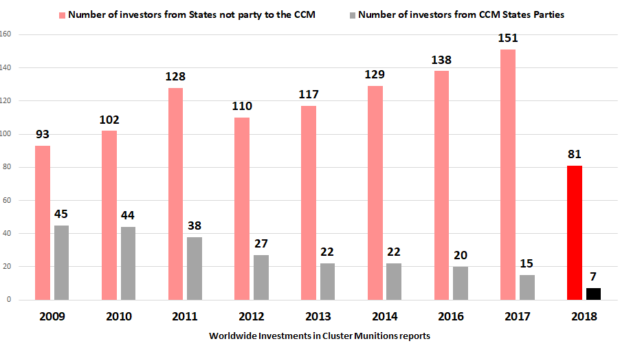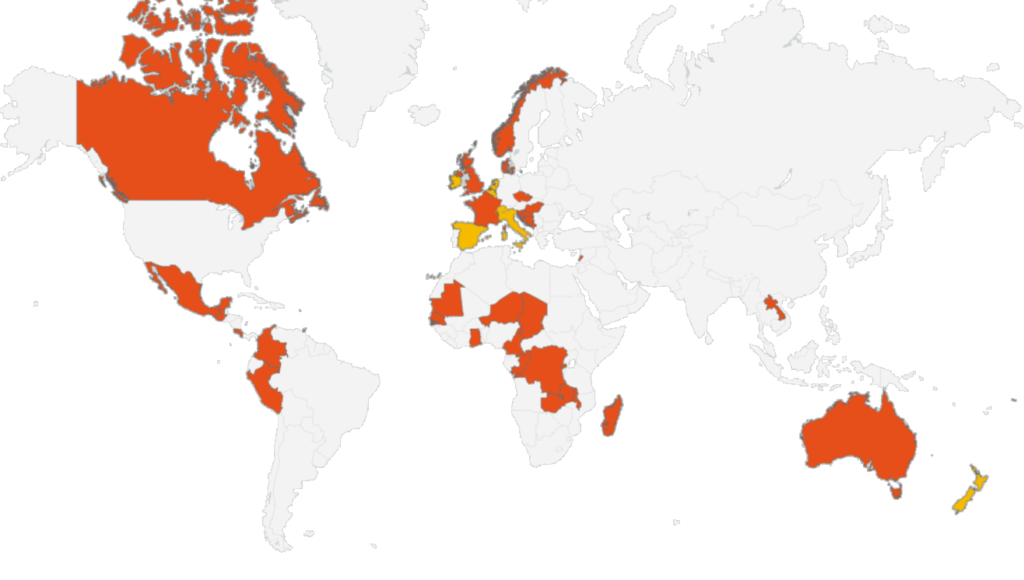0
Producers of cluster munitions on the Red Flag List
$
0
Total investments listed in the Hall of Shame in US$ millions
0
Financial institutions listed in the Hall of Fame & Runners Up
0
Number of states prohibiting investments in cluster munitions
Introduction
Cluster munitions are indiscriminate weapons that pose a serious threat to civilian populations during and long after an attack. They spread dozens, or even hundreds, of bomblets called submunitions over an area the size of a football stadium or even more. On impact cluster munitions kill or maim anyone that is in that area. Also, many submunitions fail to explode on impact: they remain on the ground like landmines that kill and injure civilians long after the conflict has ended.
The Cluster Munition Coalition (CMC) and its member organization PAX have been working towards a world fee of cluster munitions for over a decade and PAX leads the campaign to stop money flowing to the production of these heinous weapons.
Because of their inherently indiscriminate nature, cluster munitions are prohibited by the 2008 Convention on Cluster Munitions, which 120 states have joined. However, some other countries and private companies continue to produce cluster bombs. In this report, the Stop Explosive Investments campaign calls on all financial institutions and states to end all investments in these companies – because without money these bombs cannot be produced and each weapon that is not produced cannot cause harm to civilians.
This is the 9th edition of Worldwide Investments in Cluster Munitions and it clearly shows that the report and the Stop Explosive Investments campaign it is part of, are effective. For example, two major US arms producers that featured in the 2017 edition of the report, Textron and Orbital ATK, have declared publicly that they no longer produce any cluster munitions. Orbital ATK even declared publicly that cluster munitions have no place in the arsenal of a modern army. These developments are at least partly the result of the pressure from the financial sector.
This major success deserves celebration. At the same time this report includes 3 new companies involved in the production of cluster munitions. In addition, close to US$ 9 billion was invested by financial institutions from around the world in these cluster bomb producers. This shows that states, financial institutions and NGOs need to stay vigilant and call out any company that still produces cluster munitions to stop production – just as it is of vital importance to continue to condemn any use of cluster munitions anywhere by anyone.
7 Producers of Cluster Munitions
• Avibras (Brazil) – NEW
• Bharat Dynamics Limited (India) – NEW
• China Aerospace Science and Industry [CASIC] (China)
• Hanwha (South Korea)
• LigNex1 (South Korea) – NEW
• Norinco (China)
• Poongsan (South Korea)
The report identifies 7 companies from 4 countries that are involved in the production of cluster munitions and that we find financial links with. It is important to note that this list of cluster munitions producers is by no means exhaustive: there are several producers that our research did not discover any financial links with – these companies are not included in our report.
Elbit Systems takes over IMI
The Israeli cluster munition producer IMI Systems will be acquired by Elbit Systems. As of early October 2018, the takeover was in its final stages. We found now financial links with IMI. However, PAX calls on
investors in Elbit Systems to divest from the company unless they announce they will stop producing cluster munitions as soon as the takeover of IMI systems is finalized.
More information about the producers
Hall of Shame
This 2018 report lists 88 financial institutions that together invested a total of US$ 8700 million in the 7 cluster munitions producers identified in this report. The research investigated all types of investments in the 7 companies between January 2015 and April 2018.
This is a dramatic drop from the 2017 report, which listed 166 investors and a total of US$ 31 billion invested. To a large extent, this can be accounted for by the fact that two US cluster munition companies are no longer included as producers in this report, as they have statedthey no longer produce cluster munitions.
Of the 88 investors that are identified in the Hall of Shame, only 7 have their headquarters in states that have joined the CCM. Still, all of these 5 States Parties to the CCM, have expressed in some way that investments in producers of cluster munition are prohibited by the CCM.

This means that there is still work to do in making sure that their commitment is fully implemented. However, if we compare the number of investors from these 5 CCM States Parties to the 81 financial institutions from non-CCM states, the effect of the Convention is clearly visible.
It is important to note that the Hall of Shame is not comprehensive. These is still a lack of reliable and publicly available information about the production of cluster munitions and investments in cluster bomb producers. In addition, for practicality purposes this report only includes the more significant investments. All financial links that we found are available online at www.stopexplosiveinvestments.org.
Divest
This report calls on all banks, insurers, pension funds and other financial institutions to end all investments in cluster munition producers, and to adopt comprehensive policies preventing such investments from occurring in the future
More information about the Hall of Shame
Hall of Fame & Runners-Up: policies to stop explosive investments
Our research identified 110 financial institutions with a publicly available policy excluding producers cluster munitions from investment. This is an increase of 22 compared to the previous report.
This welcomed increase reflects the evolving consensus among investors. While only a few financial institutions excluded companies that produced cluster munitions when the CCM was negotiated, a much wider group of investors is now aware that producers of cluster munitions are not acceptable business partners.
Our research shows that not only ethical banks, small pension funds and government-managed funds divest from cluster munition producers: major global financial actors like HSBC (United Kingdom), Royal Bank of Canada (Canada) and Mitsubishi UFJ Financial Group (Japan) have divestment policies in place as well. These financial institutions show that although it takes time and effort to bring about change, it can be done.
48 financial institutions in our report have comprehensive policies in place, prohibiting all investments in cluster munition producers and are therefore listed in the Hall of Fame.
The Runners-Up section lists 62 more financial institutions that have a policy on cluster munitions, but their policies show certain shortcomings. We commend these financial institutions in the Runners-Up, because by taking steps to ban investments in cluster munition producers, they recognize the inacceptable nature of those weapons. We also point out the remaining steps to gain a place in the Hall of Fame.
Click here for more information about the Hall of Fame and Runners-Up
States’ best practices
Assisting anyone to make, have, get, or use cluster munitions in any way is prohibited by the CCM. Providing financial resources to companies involved in these actions is increasingly understood to be prohibited under the CCM’s prohibition on assistance in article 1(1)c. In order to build on this growing international norm, it is important that states repeatedly express their understanding that financing cluster munitions producers is prohibited under Article 1(1)c of the CCM.
An ever growing group of states shares the view that the Convention bans investment in cluster munitions. Chad, Denmark, The Gambia, Mauritania, Montenegro, Peru, St. Kitss & Nevis and Trinidad & Tobago all joined these ranks since last year’s report. This is a clear sign of the growing norm amongst states that when a weapon is prohibited, financing the producers of the weapon should also be prohibited.
The report now shows 35 countries that have made interpretive statements declaring that they consider investment in cluster munitions to be prohibited under the CCM. In addition, it lists 11 states that have adopted legislation that prohibits (various forms of) investments in cluster munitions.
11
States with national legislation prohibiting investments in cluster munitions
35
States with national legislation prohibiting investments in cluster munitions

Click here for more information about states’ best practices
Download the full report
